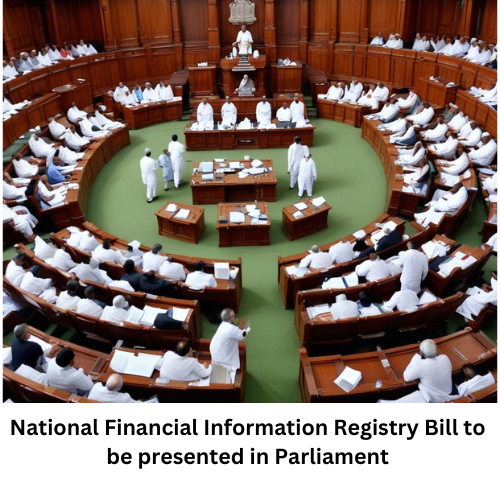What is National Financial Information Registry Bill???

The National Financial Information Registry (NFIR) Bill is a legislative proposal in India aimed at establishing a comprehensive registry to store and manage financial information. But why is this bill needed?? Let us understand this concept in detail
- The National Financial Information Registry (NFIR) Bill is needed for several key reasons, each addressing specific challenges and gaps in the current financial ecosystem of India. A centralized registry of financial information will provide greater transparency in financial transactions and credit histories, making it easier for financial institutions to assess risks and make informed decisions.
- By having comprehensive and accurate financial information readily available, lenders can better evaluate the creditworthiness of borrowers, leading to improved access to credit for individuals and businesses, especially for those who might be underserved or have limited credit history. A centralized database can help in detecting and preventing fraudulent activities by providing a clearer picture of financial transactions and histories, making it more difficult for fraudulent behavior to go unnoticed.
- Consolidating financial information into a single registry can streamline various financial processes, reducing duplication of efforts and increasing efficiency within the financial sector. The availability of detailed financial data can assist policymakers in making more informed decisions regarding financial regulations and economic policies, leading to better outcomes for the economy as a whole.
- The Bill includes provisions for data privacy and security, ensuring that financial information is protected and that the rights of individuals and businesses are safeguarded. By improving the efficiency and transparency of the financial system, the NFIR can contribute to overall economic growth by fostering a more robust and trustworthy financial environment. The registry can help in promoting financial inclusion by providing a reliable database that financial institutions can use to extend services to a broader segment of the population, including those in remote or underserved areas.
Bill For NFIR At Advanced Stage; Likely To Be Introduced In Next Session
- The Budget 2023-24 proposed setting up of NFIR as a central repository of financial information to facilitate the efficient flow of credit, promote financial inclusion and foster financial stability in the country. The passage of the Bill will enable in setting up of a registry and thus help in consolidating all financial information and facilitating financial inclusion, and take the Indian economy onto a faster growth trajectory.
- Credit bureaus give information on the credit taken out by a person or business, but they do not have complete visibility over the assets, activity, and liabilities position. National Financial Information Registry (NFIR) is an autonomous state-owned organisation under RBI that facilitates data collecting, security frameworks, operating modalities, and a role-based information exchange mechanism for specified end points or organisations.
- NFIR’s major purpose is to construct a public infrastructure for sharing credit-related, activity-related, and asset-related information with lending and other selective authorities.
Future with NFIR
- The future with the National Financial Information Registry (NFIR) in India could bring significant improvements and transformations in various aspects of the financial ecosystem.
- The NFIR will provide a comprehensive and centralized database of financial transactions, increasing transparency across the financial sector. Greater transparency will foster trust among financial institutions, investors, and consumers, leading to a more robust financial system. Financial institutions will have access to detailed and reliable financial data, enabling more accurate assessments of creditworthiness. Better risk assessment can lead to increased lending, particularly to small businesses and individuals with limited credit histories.
- A centralized registry can help detect and prevent fraudulent activities by identifying discrepancies and unusual patterns in financial data. Financial institutions can more easily comply with regulatory requirements and perform due diligence, reducing the risk of fraud. Consolidating financial information into a single registry reduces duplication of efforts and streamlines various financial processes. Improved efficiency can lead to cost savings for financial institutions and lower costs for consumers.
- Policymakers will have access to comprehensive financial data, enabling them to make informed decisions about regulations and economic policies. Data-driven insights can help design targeted interventions to address specific economic challenges and promote growth.
- NFIR is managed by the Regulator, RBI, Govt of India so the likelihood of lenders making wiser decisions is very high. There is Greater potential in the foreseeable future to seize nonperforming assets (NPA). Transparent and reliable financial information can attract more domestic and foreign investments, boosting economic growth.
- A robust financial infrastructure can enhance the stability and resilience of the financial system, reducing vulnerabilities to economic shocks. The NFIR can help extend financial services to underserved and remote areas by providing reliable financial data to institutions. : Improved access to credit and financial services can empower individuals and small businesses, contributing to overall economic development.
- Strong data protection measures can increase consumer confidence in the financial system. : The NFIR will include provisions for data privacy and security, ensuring that financial information is protected and the rights of individuals are safeguarded.
Key Points related to NFIR
Budget 2023 proposed the establishment of a National Financial Information Registry (NFIR) to serve as a central repository for financial and supplementary data. The NFIR will promote credit flow efficiency, financial inclusion, and financial stability. The NFIR framework will be created in collaboration with RBI.
- NFIR includes both financial and nonfinancial details.
- NFIR includes information from the MCA (financials), SEBI (promoter and shareholding data), GST, CBDT, CBIC, and CERSAI.
- Through NFIR, the government and lenders can obtain comprehensive information about the borrower.
- NFIR’s scope is significantly greater than CIBIL’s, so it cannot be compared to CBs like CIBIL.
- If the lender lacks sufficient information about the borrower, this creates a risk for the lender, resulting in a higher interest rate.
- NFIR reduces risk for all parties involved and promotes equitable loan pricing.
- In subsequent phases, NFIR would augment RBI’s due-diligence systems like CRILC.
Conclusion
In summary, the implementation of the NFIR has the potential to significantly enhance transparency, efficiency, and trust in India’s financial sector, leading to improved credit access, reduced fraud, better policy-making, economic growth, and financial inclusion, all while ensuring data privacy and security.





